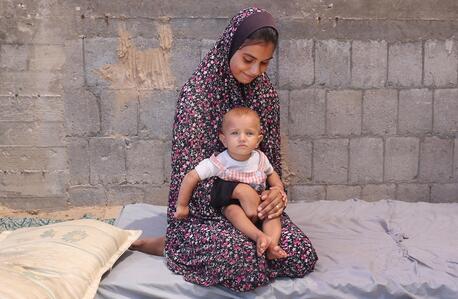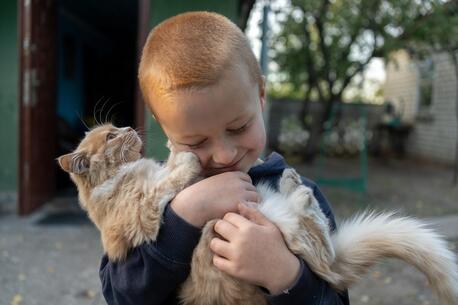
After 8 Years of War, 11M Children in Yemen Need Humanitarian Aid
Almost a decade of conflict has devastated the lives of millions of children in Yemen. UNICEF and partners are providing urgent humanitarian aid.
As the war in Yemen stretches into its ninth year, children remain caught in the crosshairs. More than 11,000 children were killed or seriously injured between March 2015 and November 2022, according to UN-verified reports. Fierce conflict, economic collapse and a crippled social support system have left 11 million children across the country in need of one or more forms of humanitarian aid.
Thousands of children killed or injured, millions suffering from malnutrition
The conflict has also exacerbated the country's ongoing malnutrition crisis: 2.2 million children are suffering from acute malnutrition; more than 540,000 under age 5 have been diagnosed with severe acute malnutrition, a life-threatening condition if not treated urgently.
“The lives of millions of vulnerable children in Yemen remain at risk due to the almost unimaginable, unbearable consequences of the crushing, unending war,” said UNICEF Yemen Representative Peter Hawkins. “UNICEF has been here, providing desperately needed support throughout the past eight years, and before, but we can only provide so much support to children and families affected without a lasting peace.”
Children did not start this conflict, but they continue to suffer most from its consequences.
Years of conflict, misery and grief have left up to 8 million people in need of mental health and psychosocial services in Yemen. With multiple threats and displacements, children and caregivers are under constant strain. Often they resort to negative coping mechanisms like child marriage, child labor and in many cases recruitment into the fighting.
More than 4,000 children have been recruited and used by the warring parties and there have been more than 900 attacks on and military use of educational and health facilities, all of which hinder the realization of children’s basic rights to safe and adequate access to health and education. These are just the verified numbers — the true toll is likely much higher.
After eight years, many children and families feel stuck in a perpetual cycle of hopelessness.
Millions have been displaced by fighting, many families multiple times. Over 2.3 million children are still living in displacement camps where their access to basic health, nutrition, education, protection and WASH services remains inadequate.
“After eight years, many children and families feel stuck in a perpetual cycle of hopelessness,” said Hawkins. “Visiting a family recently who have been displaced from their homes for over seven years, you realize that for too many families, little of their situation has changed beyond the children’s faces. Children have grown up knowing little but conflict, providing these children with some room for hope of a peaceful future is absolutely critical.”

UNICEF urgently requires $484 million to continue its lifesaving humanitarian response for children in Yemen in 2023. If funding is not received, UNICEF might be forced to scale down its vital assistance for vulnerable children.
“The children of Yemen should be able to look to the future with hope, not fear. We call on all parties to help us deliver that hope by committing to the Yemeni people, and pulling a country, and a weary population, back from the brink,” said Hawkins.
UNICEF needs more funding to reach more children in Yemen in 2023
The funding gap UNICEF continued to face through 2022 and since the beginning of 2023 is putting the required humanitarian response for children in Yemen at risk, including access to health, nutrition, education and WASH services. Without UNICEF’s support, these children’s potential to survive and develop in the complex humanitarian crisis is significantly reduced.
Despite the challenges, in 2022 UNICEF was able to:
- Support the treatment of severe acute malnutrition for more than 375,000 children in 4,584 primary health care facilities and 34 therapeutic feeding centers
- Provide emergency cash transfers to almost 1.5 million households every quarter — benefitting around 9 million people
- Provide access to safe and sustained drinking water to 6.2 million people through a wide spectrum of activities including water trucking, the installation of water distribution points and the expansion of water supply systems to camps for the internally displace. UNICEF also provides fuel to support the production and distribution of clean water to 36 Local Water and Sanitation Corporations in 15 governorates
- Provide vaccination against measles and polio to at least 2.1 million children who have little to no access to primary health care
- Reach more than 478,000 children and caregivers in conflict-affected areas with psychosocial support, and over 5.2 million children and community members with lifesaving mine-risk education
- Reach more than 2.7 million people living in remote rural areas with access to services at public health care centers
- Support mother, newborn and child health (MNCH) services in 24 hospitals providing operational assistance, as well as equipment and supplies,
- Scale up support for the treatment and prevention malnutrition by 4,500 static outpatient therapeutic program (OTP) centers and 288 mobile teams
- Provide more than 538,800 children with individual learning materials, and more than 856,600 children with access to formal and non-formal education, including early learning.
UNICEF won't stop until every child is healthy, educated, protected and respected. Your contribution can make a difference. Please donate today.
HOW TO HELP
There are many ways to make a difference
War, famine, poverty, natural disasters — threats to the world's children keep coming. But UNICEF won't stop working to keep children healthy and safe.
UNICEF works in over 190 countries and territories — more places than any other children's organization. UNICEF has the world's largest humanitarian warehouse and, when disaster strikes, can get supplies almost anywhere within 72 hours. Constantly innovating, always advocating for a better world for children, UNICEF works to ensure that every child can grow up healthy, educated, protected and respected.
Would you like to help give all children the opportunity to reach their full potential? There are many ways to get involved.





